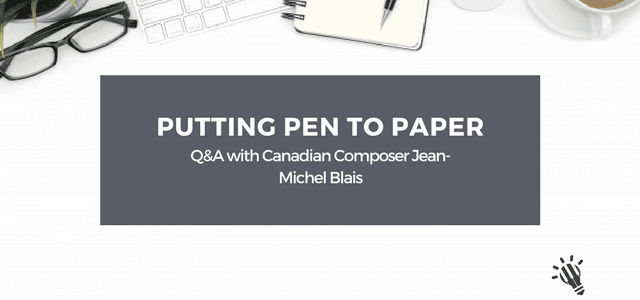
Jean-Michel Blais is a world renowned Canadian-French composer. You may have heard his compositions in the past on Spotify or YouTube. We have included a video of one of his pieces in this post, so be sure to have a listen!
We are so lucky to have had the chance to ask Jean-Michel a few questions for topmusic.co. In line with our Piano Composition theme for August, we hope you find his insights valuable.
Jean-Michel: This is hard to tell. I think it’s rather a context than a place. Meaning, when I feel it’s time for it, I’ll sit on a piano and music will come through me, as a need to fulfil, as a will to express. What I’ve noticed after a while is that there’s a relation between events happening in my life and creative moments. Simply put, I’d say my music is somewhat a personal though somewhat universal transcription of life experiences into musical language.
Usually, it’s quite simple. I feel like I need to ‘say’ something, then I’d sit at my piano, or anything that has a keyboard, that I find close to me. Then I let my fingers explore the keys, improvising somehow. I think the most important part in my case is that it generally comes roughly and quite incompletely; then I always let the ideas rest and trust my memory to remember, distinguishing what’s good from what’s less. Basically, I’ll remember what I prefer and then progressively weave it together into an actual piece until I feel it’s finished, although it never is.
As I never know in advance if I’m starting to write a beginning or not, I rather prefer creating some independent chunks that I’ll later understand and assemble within a larger narrative. One could argue I approach music as if it were architecture: time architecture you could say. Therefore, it’s hard to tell how fast it comes, since I never know which building I’m working on. I can come up with a new piece in a few days, and sometimes it may take years! Nonetheless, I don’t feel like I’m creating as much as I’m discovering them. It’s as if they are pre-existent, and my job being, as an archaeologist, to excavate, polish, understand, and unify them.
Of course I am! Ask my peers or my label. And this can be annoying (for them) sometimes. For instance, when I refuse to release something I’m not completely satisfied with, or when I feel it’s not fitting the general concept, or when I’m convinced I lost inspiration. What helps me is thinking that perfection should encompass imperfection also; therefore a refined and comfortable idea should somewhat leave space for roughness and spontaneity, for instance. I think this is what Il is trying to say with its noise, clunky instrument, and raw recording.
Let yourself dig a mine and search and observe, and when you find a golden thread, you’ll know it, ‘cause you won’t doubt anymore. I really think you have to start from a raw, rough, deconstructed perspective to give the mind freedom to become playful, without judgment, away from self-consciousness. And only when it feels it’s truly making sense from within, that’s the moment when you can call it a composition.
From an individualistic point of view, I like to compare it to attending a psychologist session. It’s a moment to sit, let go, express, project, extract, empty, articulate, and understand. I think the benefit is somewhat similar, meaning that it allows the composer to transform into a universal language, which speaks without uttering a word. From a collective perspective, I notice the impact comes after sharing music: people come to me expressing how released, enlightened, lifted, awoken, or understood they feel, especially in the quasi-spiritual moment of the concert.
Of course! It all depends on your definition of what a ‘composition’ means. In fact, my godson, who’s about two years old, and I improvise sometimes together. He inspires me mainly because he naively and spontaneously creates motives I wouldn’t think about, especially because of my formal musical instruction. One can’t really unknow. Nonetheless, I think composition starts when you purposely select to structure time, to recall and present in a predetermined sequence of sets, sounds. And this can happen as soon as consciousness is on board.
I’m sad that I can’t answer this question. This fluctuates according to changes in emotion, time of the year, period of my life, reason why I’m listening to music. The only tendency I’ve observed is inconstancy.
I’ll be far from where I was one year ago (still teaching full-time, special education). I’m now about to tour parts of Canada, visit Mexico, and France also. Meanwhile, I’m finishing mixing my next LP. Unfortunately, nothing’s yet planned for Australia, but this is a dream we’re working on.
My current piano coach/mentor found me while I was improvising at age 11 and proposed giving me piano courses, where we literally started with composition. Her profound belief in my capabilities mixed with a non-orthodox and holistic approach to music helped me develop a solid base where actual music, and inspiration from ‘muses’, was always preserved at its heart. My first concert I presented my own reinterpretation of Pachelbel’s Canon and I haven’t stopped composing since that day. It’s stronger than me…
You can view Jean-Michel Blais’ website here, where you can find sheet music for some of his compositions.

FirstKellie says:
I see you don’t monetize your website, don’t waste your
traffic, you can earn additional cash every month because you’ve
got hi quality content. If you want to know how to make extra money,
search for: Mrdalekjd methods for $$$